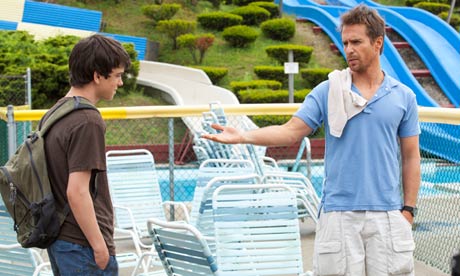
Although Sundance has a good reputation for films that take risks, it is equally notorious for films that don't. In the cold light of day – after a rapturous world premiere, where it received a standing ovation, and an aggressive bidding war that culminated with it being sold for an eight-figure sum – this pasty, bittersweet comedy falls very much into the latter category.
Watching it feels like fast-forwarding through an extended clip-reel of the ghosts of Sundance past without ever pausing to press play. It even reunites Steve Carell and Toni Collette, the stars of 2006's Little Miss Sunshine – still the modern template for the kind of film most likely to do business here.
Yet again, the premise is a dysfunctional family trip. The film begins with a car journey, and we learn that single mother Pam (Collette) is taking her 14-year-old son Duncan (Liam James) on holiday with her to a beach house owned by her new boyfriend, Trent (Carell). Blanked by Trent's daughter Steph (Zoe Levin), Duncan feels miserable and excluded. But venturing out on his own, he finds a dilapidated amusement park called Water Wizz, where he meets the anarchic but avuncular manager Owen (Sam Rockwell). The boy spends all his spare time there, fitting in well with the staff's many oddballs, but Pam's masochistic devotion to the philandering Trent causes problems at home.
There are plenty of comic moments, most of them involving Rockwell channelling manic, Caddyshack-era Bill Murray. The wonderful Alison Janney, who plays Trent's booze-cruiser neighbour Betty, also deserves a special mention here. But The Way, Way Back is very rarely laugh-out-loud funny.
Unfortunately, neither is it very involving. Though it's good to see Carell play against type, menacing the introverted Duncan with a vile character assassination in the film's startling opening scene, his character never progresses beyond bully, liar and cheat. Collette adds another crazy, needy, weirdly-wardrobed mother to a CV that's already full of them. As for James, he is believable as the outsider, but his subsequent growth barely registers and a promisingly awkward beach party scene, in which he finally stands up to Trent, soon fizzles out.
The anticlimactic ending doesn't really help; when the credits roll, one is left thinking less of the fate of the characters than of the rollcall of Sundance offerings this film resembles. More specifically, though, it worryingly threatens to follow the lead of 1999's Happy, Texas – still the benchmark for films that have their moment in the Park City sun then vanish in the real world like spit on a griddle.

